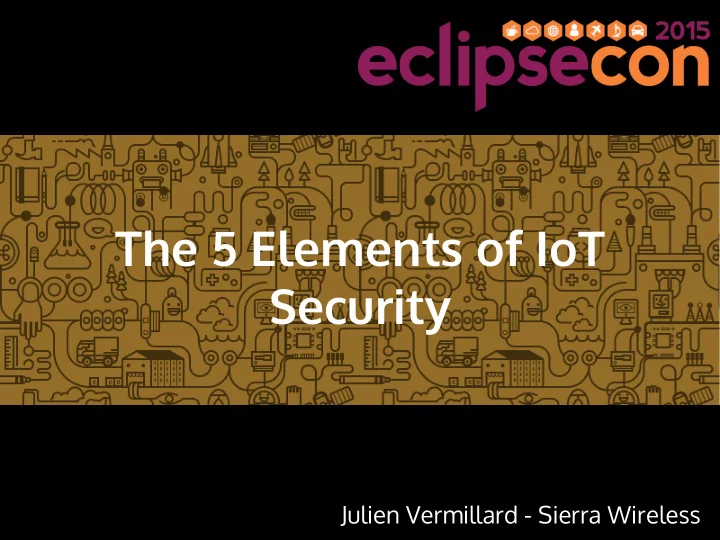

The 5 Elements of IoT Security Julien Vermillard - Sierra Wireless
Who am I? Software Engineer Sierra Wireless AirVantage.net cloud service Eclipse IoT: Leshan project lead Wakaama and Californium committer Twitter: @vrmvrm Email: jvermillard@sierrawireless.com
Agenda In the news Hardware OTA Upgrades Secure Communication Key Distribution Cloud Security Open Source IoT Infrastructure
In the news “The killer toaster” “The nightmare on connected home street” “What’s wrong with connected devices”
HP Fortify 2014 IoT security report Reviewed the most popular devices: TVs, webcams, thermostats, power outlets, sprinkler controllers, hubs for controlling multiple devices, door locks, home alarms,scales, and garage door openers 90% collected personal data 70% used unencrypted network services http://h20195.www2.hp.com/V2/GetDocument.aspx?docname=4AA5-4759ENW&cc=us&lc=en
Secure your hardware
Hardware security Risks: Mitigation: Rogue firmware Secure storage Invisible backdoor Secure boot Malicious certificate Eavesdropping Drawbacks: Vendor lock Tivoization Nest Example: https://www.blackhat.com/docs/us-14/materials/us-14-Jin-Smart-Nest-Thermostat-A-Smart-Spy-In-Your-Home.pdf
You can’t secure what you can’t update
High engineering and BoM cost! Custom bootloader Flash size
Flash & switch update Bootloader Firmware Firmware V 1 V 2
Reboot & Patch update Bootloader Firmware Patch
Must be bulletproof Upgrading is hard: ● NAND flash errors ● Unexpected power loss ● Network errors ● Unexpected incompatibilities ● Checksum, cryptographic signature A 0.1% failure rate on a 1m fleet is 1000 bricked devices
Secure Communication
Cipher suite? Pre-shared key TLS_PSK_WITH_AES_128_CCM_8 Client and server have a common secret Symmetric cryptography Tampering the device or the server give you access to all the future and past communications
Secure communication is not cheap https://tools.ietf.org/html/draft-ietf-lwig-tls-minimal-01 +----------------------+-----------------+ | | DTLS | | +--------+--------+ | | ROM | RAM | +----------------------+--------+--------+ | State Machine | 8.15 | 1.9 | | Cryptography | 3.3 | 1.5 | | DTLS Record Layer | 3.7 | 0.5 | +----------------------+--------+--------+ | TOTAL | 15.15 | 3.9 | +----------------------+--------+--------+ Table 1: Memory Requirements in KB
Cipher suite? Public Key TLS_ECDHE_ECDSA_WITH_AES_128_CCM_8 Server and client don’t share private keys, only public keys Perfect forward secrecy: past communication can’t be decrypted after secret compromission
X.509 Certificate Chain-of-trust for validating identity! No more credential provisioning Used for HTTPS
Certificate: revocation checks Revocation checking is still an issue in 2015: Validity date checking: RTC? NTP? More and more complexity on the device side: CRL, OCSP, stapling Hard fail? Soft fail? Certificate pinning?
Pre-shared key vs X.509? PSK is lighter, can run on very small target X.509 crypto is heavier: (EC)DH,ECDSA/RSA PSK Infrastructure is simpler but weaker (Hello SIM card key files) X.509 Public Key Infrastructure is complex, but can be outsourced
Key Distribution
Pre-shared key generation Everything should be provisioned at factory? Don’t move big plain text list of credentials Don’t use stupid formulas: password = MD5(IMEI + CARRIER_NOT_SO_SECRET) https://www.blackhat.com/docs/us-14/materials/us-14- Solnik-Cellular-Exploitation-On-A-Global-Scale-The-Rise- And-Fall-Of-The-Control-Protocol.pdf
Secret rotation Be sure to be ready to change them ASAP Don’t wait the next Heartbleed for doing it � Good practice: Changing the factory credential during the 1st communication
Key management protocols? Enterprise PKI for X.509: CMP, OCSP For PSK or X.509: Lightweight M2M bootstrap
LwM2M bootstrap in a nutshell Flash bootstrap credentials
LwM2M bootstrap in a nutshell I only have bootstrap credentials or I can’t reach final server
LwM2M bootstrap in a nutshell POST /bs Bootstrap Server
LwM2M bootstrap in a nutshell Write DM URL & credentials Bootstrap Server
LwM2M bootstrap in a nutshell I have credential for the DM server Bootstrap Server DM Server
LwM2M bootstrap in a nutshell POST /rd Bootstrap Server DM Server
LwM2M bootstrap in a nutshell Start managing the device Bootstrap Server DM Server
Server Security
Why it’s mattering? Risk: Takeover of your whole device fleet You are a juicy target Mitigations: More security (ex. 2 factor auth) than classical web service Collect only the necessary data Isolate as much as possible web and devices
Now where I start?
Ask more time/budget?
Now you are part of the 70% unencrypted network services
Open-source to the rescue!
Eclipse IoT - Leshan Lightweight M2M implementation in Java A library for building: bootstrap, and device management servers Support DTLS PSK, RPK, (X.509 soon) And also client for beefier devices or testing
Eclipse IoT - Leshan Update firmware, software Manage secrets (bootstrap) Monitor and configure device Can support custom object for applications IPSO objects
Eclipse IoT - Wakaama C implementation of Lightweight M2M Focused on embedded Bring your own IP stack Bring your own DTLS implementation Bootstrap supported
Eclipse IoT - Wakaama You can receive packages for firmware/software update But you need to implement live re-flashing on your platform Known to be running on Linux, Arduino mega, ARM Cortex processors
TinyDTLS | https://tindydtls.sf.net MIT License, Eclipse proposal! “Support session multiplexing in single- threaded applications and thus targets specifically on embedded systems.” Examples for Linux, or Contiki OS
TinyDTLS Supported ciphersuites: TLS_PSK_WITH_AES_128_CCM_8 TLS_ECDHE_ECDSA_WITH_AES128_CCM_8
From Toolbox
To Jump start
Thanks! Questions? Contact me: @vrmvrm jvermillard@sierrawireless.com Blog post
Evaluate the sessions Sign in: www.eclipsecon.org +1 0 -1
Recommend
More recommend